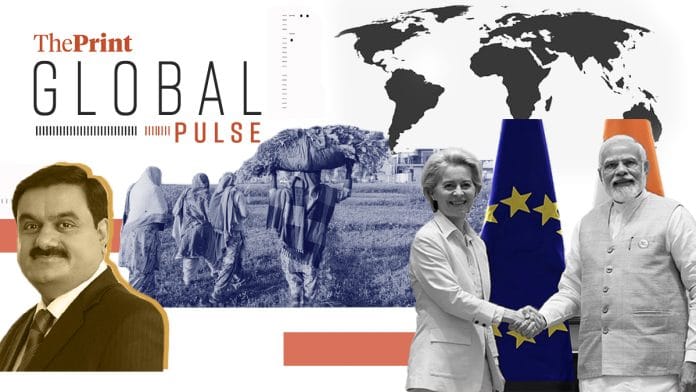New Delhi: The Adani Group has revived its plans to invest in the US despite the fact that Gautam Adani is fighting criminal charges there, according to Financial Times.
The plans include funding projects in the US in sectors like nuclear power and utilities, as well as an east coast port, Financial Times says.
Adani had earlier pledged to invest $10 billion in the US and create up to 15,000 jobs but those plans were widely thought to be on hold after US authorities indicted him and seven others in an alleged $265 million Indian solar energy bribery scheme, it states.
But there’s been “big relief” within the Adani Group, says the report, after US President Donald Trump halted the enforcement of the Foreign Corrupt Practices Act in the US.
“The US charges have presented an unprecedented threat to Adani, who has long-standing ties with Indian Prime Minister Narendra Modi and whose conglomerate is deeply embedded in India’s drive to develop its infrastructure drive and boost its international influence,” says Financial Times.
PM Modi said he hadn’t discussed the Adani cases with Trump during his recent visit to Washington, the report adds.
“The billionaire’s perceived close relationship with Modi remains a politically charged issue in New Delhi and a focal point for criticism by opposition politicians who allege Adani has benefited from government favouritism—an accusation he denies,” the article states.
Politico reports on the European Union delegation’s visit to India last week, noting that a closer alliance with India would be a “cornerstone of Europe’s policy in the years and decades to come”, built on enhanced cooperation on trade, technology, security and defence.
The visit was the new European Commission’s first to India, and was significant as it shows the EU is trying to keep New Delhi “onside amid rising geopolitical tensions with the United States and China”, according to the report.
India and the EU resumed talks on a free trade agreement in 2021 after they collapsed in 2013. While progress has been slow, Politico notes that both sides seem determined to strengthen ties to counter America’s tariff threats and China’s aggressive trade practices.
Meanwhile, The Washington Post has a long ground report on how women, in particular, are weathering economic stagnation in India as men are leaving their homes to chase work in cities. Women are left behind to work on the farm—and The Post reports that economists warn of a “lost decade” for rural women.
“On paper, the Indian economy shines, but opportunities are shrinking for families on the margins. Increasingly, men are leaving their homes in rural areas, chasing meagre wages in distant cities, while their wives are left behind to farm—a quietly profound transformation that economists say is straining households and contributing to a lost decade for millions of people,” the report states.
Nearly half of India still works in agriculture. While India’s economy has bounced back since the pandemic, the economy hasn’t caught up—it’s “jobless growth”, as economists say. As a result, the share of Indians working in agriculture has risen above pre-pandemic levels, with the gender gap widening, according to the report.
“Two-thirds of women working in India labour on farms, compared to just one-third of men, according to the latest government figures,” it adds.
“The consequences are stark: Indians are now poorer than Hondurans on a per capita basis. More than half of those of working age are unable to find a place in the formal economy. The government’s primary response so far has been cash handouts and other welfare initiatives, which experts say do little to address the structural problems,” the report says.
(Edited by Nida Fatima Siddiqui)






